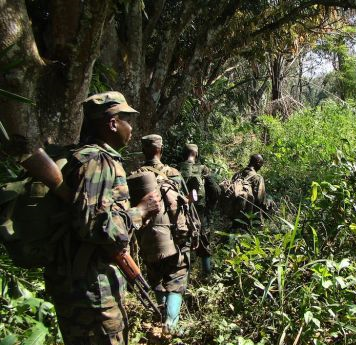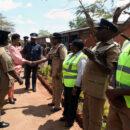Kony: What’s to be done? – Alex de Waal

As a critic of the KONY2012 campaign, I have been asked the eminently practical question, “so what would you do about Joseph Kony and the Lord’s Resistance Army?” Let me take this opportunity to respond.
There have been a number of proposals for peace in northern Uganda and the resolution of the LRA problem. As a framework, let me use a nine point comprehensive approach proposed by the International Crisis Group in January 2006.[1] Three points are military, six non-military. Let me give a scorecard for each one.
- Apprehending the Indictees. Crisis Group called for capturing Joseph Kony and the other LRA commanders wanted by the International Criminal Court. Clearly, six years on, this has not been achieved, despite at least two major multinational operations (2006 and 2008) and other military efforts. The most recent initiative, set up in November 2011, is an African Union-led, UN and US-supported, four national joint military command. The scorecard: repeated effort, no success yet.
- Crossing Borders in pursuit of the LRA. Before 2006, the LRA had evaded military pressure by escaping into southern Sudan or DRC, so this recommendation was intended to ensure an end to safe havens, and in particular that the Ugandans could pursue the LRA when it crossed a border. Since 2006, there has been good cooperation, culminating in the current AU effort, which surpasses the recommendation insofar as there are four armies, from Uganda, South Sudan, DRC and Central African Republic under a single command, with international backing. Scorecard: expectations surpassed.
- Protecting Civilians. The Ugandan People’s Defence Force (UPDF) failed to protect civilian populations from the LRA. Equally seriously, UPDF troops, who were far more numerous than the LRA, were themselves responsible for many abuses against civilians. The withdrawal of the LRA from Uganda in 2006 meant that it ceased to threaten Ugandans, though it has since threatened Congolese, South Sudanese and Central Africans. The removal of the LRA threat also meant that the UPDF deployment in northern Uganda has been scaled down, and IDPs have returned to their homes. Scorecard: near total success in Uganda, limited progress outside Uganda.
- Comprehensive Dialogue. This recommendation referred primarily to the peace talks that were convened from 2006-2008 in southern Sudan, that didn’t succeed. There is now little prospect of new peace talks, and so the recommendation as framed six years ago is no longer relevant. However, the wider issue of the political accommodation of northern Uganda within Ugandan national politics is important, and this has indeed occurred. Peace has returned to northern Uganda. Scorecard: mostly successful.
- Disarmament, Demobilization and Reintegration Initiative. The main concern of Crisis Group was to the return and rehabilitation of former LRA combatants, many of whom were abductees, and many of whom were children. The figure of 30,000 abductees sometimes mentioned includes both adults and children and refers to those who have been processed through reintegration programs. This represents the vast majority of former members of the LRA. Scorecard: mostly successful.
- Humanitarian Aid. Crisis Group focused on emergency assistance to people displaced by the war. It didn’t go so far as calling for reconstruction and development. Six years on, the humanitarian crisis has been resolved to the extent that emergency relief has been replaced by reconstruction and development. Scorecard: success, with expectations exceeded.
- UN Security Council Action. The issue here was appointing a “UN envoy of stature” to lead the negotiations. Former Mozambican President Joachim Chissano was appointed but the initiative did not succeed. The UN Security Council and the African Union Peace and Security Council remain actively engaged, for example in mandating the four-nation military force that is spearheading the current military effort. Scorecard: recommendation implemented, but these actions have not yet achieved their goals.
- Truth and Reconciliation Efforts. The reference here was to healing the wounds of war, going beyond the headline issue of prosecuting the major human rights offenders and also promoting reconciliation, involving traditional reconciliation approaches, psycho-social programs, reopening schools, etc. These are all slow and complicated processes and it is difficult to assess the record, but they are being attempted, more seriously and systematically than in most post-conflict situations. Scorecard: recommendation implemented.
- Diplomatic Engagement. In 2006, Crisis Group referred to the need of donor countries “to engage quietly but strongly with President Yoweri Museveni and other Ugandan political leaders to make resolution of the conflict a major priority of the government and of all presidential candidates.” This was a coded reference to the political marginalization of northern Uganda and the way in which the UPDF had vested interests in the ongoing conflict (senior officers had opportunities to profit) and the ruling party had political motives for retaining the country on a war footing. Six years on, although the authoritarian and militaristic nature of the Ugandan government is unchanged, its political inclusion of northern Uganda is much improved. Scorecard: partial success.
The overall scorecard is therefore:
- Exceeded expectations: two.
- Mostly successful: three.
- Partial success: three.
- Failure: one.
My answer to the question, “if you criticize KONY2012, what would you do?” is that African and international efforts have already solved most of the problems associated with the LRA and the conflict and humanitarian crisis in northern Uganda, and are making progress in the remaining areas. Let’s keep up those efforts.
A second criticism is, “so what’s the harm in drawing more attention to this problem?” I have a number of concerns about the impact of simplistic and paternalistic portrayals of African problems, in which Africans are treated as children waiting for Americans and Europeans to save them. I have concerns about military action being presented as the principal solution.
I also have another concern, less often voiced: the high level of attention on Kony is a distraction from other issues that are equally grave or more so. Senior policymakers’ time is a very scarce resource. I recall that in 2006, senior officials in the U.S. administration estimated that President George Bush was spending more time focusing on Sudan (mostly on Darfur) than on China. What this meant in detail was that, (1) White House and State Department staff spent more time dealing with the U.S. activist groups than with the problems in Sudan itself, (2) decisions were shaped and timed by the demands of those campaigners as much as by the requirements of Sudanese realities, and (3) there was no other African political issue that could make it on to the agenda of the top decision-makers in Washington DC. Darfur was important, but not that important. Also, this exceptionally high level of attention gave the Darfur rebels the impression that they were very special indeed and could behave accordingly.
I am worried that the African troops chasing Kony will think that they have special privileges, and that the hunt for the LRA will drive other African issues off the U.S. policy agenda. Given that Invisible Children has achieved – in an election year – the remarkable feat of joining liberal internationalist students with hard-right Republican evangelicals, I worry that the U.S. administration’s Africa staff will focus more effort on managing the implications of the KONY2012 campaign than responding to the many and complicated problems of the central African region.
[1] International Crisis Group, “A Strategy for Ending Northern Uganda’s Crisis,” Jan. 2006, http://www.crisisgroup.org/en/regions/africa/horn-of-africa/uganda/B035-a-strategy-for-ending-northern-ugandas-crisis.aspx
This piece was originally published on the World Peace Foundation’s blog – Reinventing Peace








[…] Alex de Waal is at it again, this time answering those who take issue with his criticisms of the Kony 2012 campaign by asking “so what would you do about Joseph Kony and the Lord’s Resistance Army?†His response? To go through the nine-point approach of the 2006 International Crisis Group step-by-step, rating the effectiveness of each point. His conclusion? African and international efforts have already solved most of the problems associated with the LRA and the conflict and humanitarian crisis in northern Uganda, and are making progress in the remaining areas. Let’s keep up those efforts. […]
Capturing Kony is very central to peace not just in Uganda but in the region.It will send another warning to other warlords in Africa who commit egregious and atrocious crimes with impunity confident that nothing will happen to them.And sometime when peace is achieved, they join national governments; for instance Charles Taylor and Prince Johnson in Liberia. Treating criminals like Kony with kid’s gloves encourages others.Alex have you considered what the lives of under-aged children recruited by the likes of Kony have become? Kony should be captured and sent to Hague to face trial.
I do not agree with the paternalism theory about Africa and the outside world as Alex argued. The truth is that Africa is not well equipped to manage some of the crises in the continent. It needs the help of the international community. It was this African solution to African problems that allowed the genocide in Rwanda. It must not happen again.However while this campaign to capture Kony is going on, the West must also stop supporting the likes of Yoweri Museveni of Uganda. They contribute substantially to the crisis of statehood in Africa.
[…] what are the implications of such simple, and incorrect, narratives about Africa? Alex de Waal suggests that the attention that Kony 2012 drew to Uganda and the Lord’s Resistance Army may well detract […]